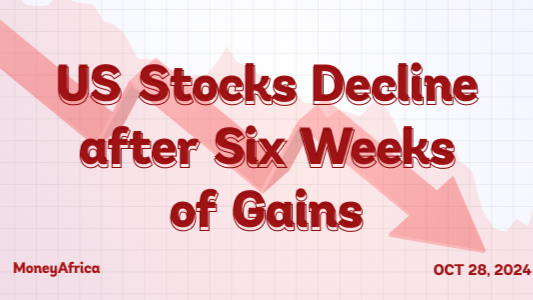
Weekly Market Commentary
Oluwatosin Olaseinde
Founder, MoneyAfrica & Ladda | Fintech | Edtech | World Economic Forum Young Global Leader | Linked In Top Voices Finance & Economy 2020 | Mandela Washington Fellowship | Financial literacy expert
US Stocks Decline after Six Weeks of Gains
Multiple concerns affected the performance of US stocks last week. For one, investors seemed to be expecting higher inflation, which is why the rate on government bonds is high despite the US Fed cutting interest rates. This potentially means the US Fed may not ease as fast, which would be unsupportive of stocks.
Investors are also taking a cautious stance ahead of the upcoming US elections, driving significant inflows into US money market funds, with $12.1 billion in new investments.?
The growing uncertainty and risk aversion among investors resulted in the US' S&P 500 losing 0.11% this week, breaking its streak of six consecutive weekly gains. The UK's FTSE 100 lost 1.07% after recovering from two consecutive weeks of losses. Globally, as represented by the MSCI World Index, stocks declined 0.65% from +0.6% in the previous week.
What this means for you: The pre-election market volatility signals a need for caution, but historically, markets have recovered quickly after election-related uncertainty subsides. Investors should maintain a long-term perspective, review their portfolios to ensure alignment with risk tolerance, and consider diversification strategies to navigate potential fluctuations.
Nigeria’s Market Update
Macro Update
NBS’ Plans GDP and Inflation Rebasing in November 2024
The National Bureau of Statistics (NBS) is responsible for reporting economic data that investors use in making decisions. The calculation of two of the most important data points about economic performance, in GDP and inflation, will be revamped in November.?
In simple terms, countries rebase data to improve quality and reliability since the structure of the economy changes over time. For instance, new goods and industries emerge, while some old ones lose relevance. These changes should be reflected in the ways that GDP and inflation data are reported.?
The last time the GDP was rebased in 2010, the economy grew bigger in naira terms by more than 60%. We do not expect an expansion of a similar size as we don’t think the economy has changed significantly since then.?
What this means for you: This is merely a statistical exercise, and it does not in any way improve living standards. The benefit is that it gives us an updated view of the structure of the economy, which can be relevant to policymakers and investors.?
领英推荐
Equities Update
Negligible Gain in Equities?
The NGX All-Share Index (ASI) recorded a gain of +1.41 last week. Year-to-date market returns closed at +33% on naira basis. On a dollar adjusted basis, Nigerian stocks have lost 43.3% YTD
Across sectors, market performance was uneven as the banking and oil and gas sectors recorded gains of 7.87% and 3.95% respectively, the industrial goods recorded a slight gain of 0.1% while consumer goods stock declined by 0.84%.
What this means for you: We do not like Nigerian stocks right now as long-term investors. Investing in the S&P 500 would have delivered a dollar return of 23.19% YTD and naira return of 102.19 %, which is better. Until we see a consistent trend of macroeconomic stability, which will be obvious in low inflation and stable exchange rates, we maintain an exposure to the US market.??
Fixed Income Update
Mixed Yields in the Money Market
The yield on the 91-day treasury bill declined to 21.71% from 21.9% in the previous week while the yield on the 182-day treasury bill increased to 26.21% from 24.2%. The 365-day treasury bill yield declined to 23.52% from 23.6%.
In the bond market, where the FG borrows for more than a year, yields decline to an average of 18.76% from 21.16% in the prior week.?
What this means for you: The yields on treasury bills remain high, which means you can earn a higher return if you are saving for short-term goals (rent, school fees, etc.) in naira. You can do this with us on Ladda—a fintech app that helps you save at high returns. We do not recommend naira treasury bills and bonds for long-term investing.?
FX Update
Nigeria Eyes Diaspora Bond as External Reserves Hit $40 Billion
Nigeria is considering issuing a US dollar-denominated diaspora bond in 2025 to tap into the lucrative remittance market. If successful, this dollar bond would support reserves and the ability to service external obligations. Meanwhile, external reserves rose by 3.3% to $40.2 billion.
The Nigerian Naira (NGN) depreciated by 0.28% against the US dollar in the official market, closing at N1,635.19 per dollar.
What does it mean for you: The slight weakening of the naira will lead to increased import costs and potential price pressures. However, the modest increase in external reserves to $40.2 billion provides some comfort that the Central Bank of Nigeria (CBN) could support the currency. We note that this is mere speculation as the net reserves situation of the CBN is unknown.?
Remember to always save for your dollar goals in dollars. You can do this with us on Ladda—a fintech app that helps you save at high returns.
Co-founder | Top 1% SEO Content Writer | B2C Marketer | Build Brand Visibility
3 周Nice write up
MBA student
4 周Very enlightening article, thank you ??
Product Management | Project management | Business Analysis | Sales | Scrum | Service Management
1 个月Great analysis ??
MBA, Executive Manager, Founder & (CEO) Temmybe Cleaning Services || Business Management Operations || Data Analyst || Faith & Kingdom
1 个月Oluwatosin Olaseinde Thank you very much once again for a very detailed article. I always look forward to reading them. ????
HR Manager @ hen n bun Pvt. Ltd.
1 个月Nice article